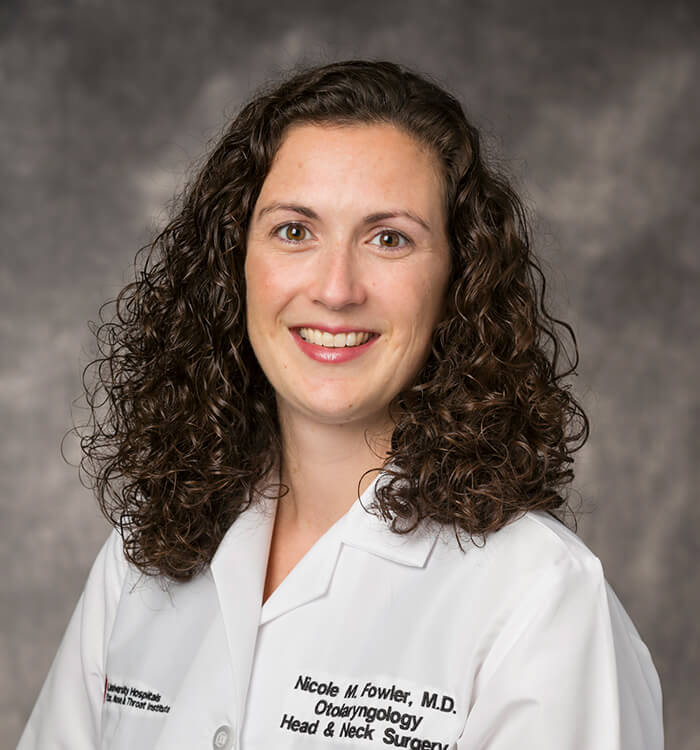University Hospitals in Cleveland Establishes Thyroid Tumor Board
December 03, 2023
Innovations in Ear, Nose & Throat | Fall 2023
University Hospitals head and neck surgeon Nicole Fowler, MD, FACS, worked in collaboration with endocrine surgery specialist Scott Wilhelm, MD, to establish a systemwide Thyroid Tumor Board. Formed in summer 2020, the board has been in place for three years, strategizing the best course of action for cases involving thyroid and parathyroid tumors.
 Nicole Fowler, MD
Nicole Fowler, MD“We have a large-volume center that treats a significant amount of thyroid pathology,” says Dr. Fowler, Program Director of Head and Neck Surgical Oncology and Reconstruction within the UH Department of Otolaryngology–Head and Neck Surgery at University Hospitals Cleveland Medical Center and UH Ear, Nose & Throat Institute. “We wanted to create a multidisciplinary board to ensure we are offering patients the highest level of care recommendations and leading-edge treatments.”
The Thyroid Tumor Board is open to all surgeons performing thyroidectomies, including ENT, endocrine and general surgeons, and endocrinologists to submit their patients for discussion. Multiple endocrinologists regularly attend the meetings, including Baha MA Arafah, MD, FCAC, Division Chief, Endocrinology, UH Cleveland Medical Center. The Tumor Board also includes a pathologist, nuclear medicine (radiology specialist) and medical oncologist.
“We have a dedicated thyroid pathologist who shares the slides from each patient’s surgery,” says Dr. Fowler. “It’s amazing how much you can learn by seeing the actual cells and analyzing how they are acting at the tissue level.” Treatment recommendations are based on these in-depth discussions, including surgery, radioactive iodine or even new targeted systemic options.
Meetings are available virtually so attendees can log in from wherever they are within the UH system. “All relevant patient information is uplinked so we can share slides and pathology and discuss difficult cases,” says Dr. Fowler. “This has been an impactful way to advance and standardize thyroid cancer care for our patients.”
For example, a discussion about whether a patient’s tumor is resectable might generate several independent surgical opinions. “For the most part, we deal with thyroid cancer that is well-differentiated and surgically resectable, but anaplastic thyroid carcinoma can be very aggressive and is not always resectable,” says Dr. Fowler. “If we are unable to operate, we talk about other potential treatment options.”
Novel Therapies
The Food and Drug Administration (FDA) has approved BRAF inhibitors (BRAFi) and other systemic chemotherapy agents for patients who have metastatic disease. Additionally, nuclear medicine colleagues have been instrumental at board meetings by recommending specialized testing or alternative treatments for rare thyroid cancers.
“By presenting these cases, we can discuss all the options and expedite targeted therapies to ensure patients are getting optimal and timely treatment,” says Dr. Fowler. “The collaborative nature of the Thyroid Tumor Board has positively impacted patient outcomes.”
Making an Impact
One example of the impact the Thyroid Tumor Board has had involved a gentleman who had a highly aggressive thyroid cancer. Dr. Wilhelm performed a total thyroidectomy and involved ENT because the patient’s vocal cord was paralyzed.
“As we were helping with his paralysis, his other vocal cord became paralyzed, and he needed a tracheotomy,” says Dr. Fowler. “Further imaging revealed that cancer had traveled into his voice box.” The board members discussed whether to do a total laryngectomy, which is an unusual surgery for someone with thyroid cancer.
“This was a person who wanted to do anything to live,” said Dr. Fowler. “To have the board weigh in and get everyone involved was extremely helpful.” Following consensus for the laryngectomy, the board recommended a sequence of therapy with radioactive iodine treatment followed by radiation.
“The patient is doing incredibly well now and has no evidence of disease,” says Dr. Fowler. “In addition to his case being presented multiple times before the board, we worked with our nuclear medicine team to run DOTATATE PET/CT scans that informed his treatment.” The next-generation scans available at University Hospitals offer improved sensitivity and resolution to image neuroendocrine tumors.
After having his larynx removed, the patient went on to get a voice prosthesis. “He has been quite an advocate for patients and very willing to share his story,” says Dr. Fowler. “He even participated in our World Voice Day!”
For more information on the UH Thyroid Tumor Board, please contact Dr. Fowler at Nicole.Fowler@UHhospitals.org.
Contributing Expert:
Nicole Fowler, MD, FACS
Program Director
Head and Neck Surgical Oncology and Reconstruction
Quality and Patient Safety Director
Department of Otolaryngology–Head and Neck Surgery
University Hospitals Cleveland Medical Center
Associate Professor
Case Western Reserve University School of Medicine


